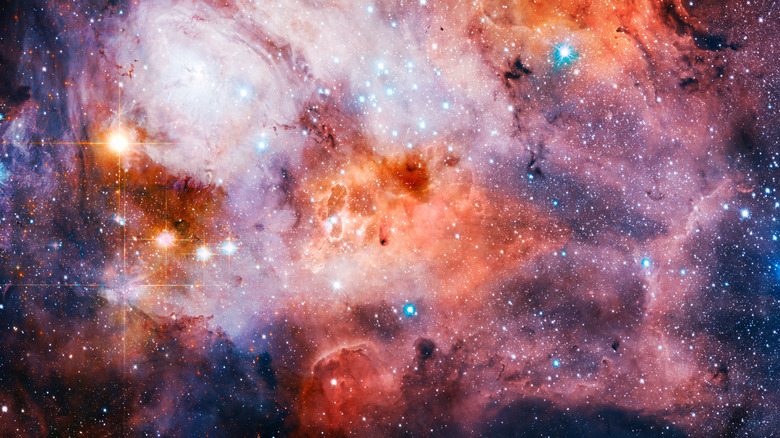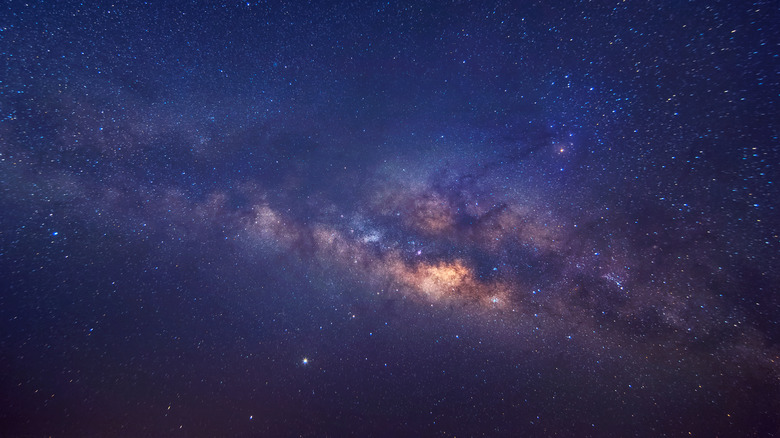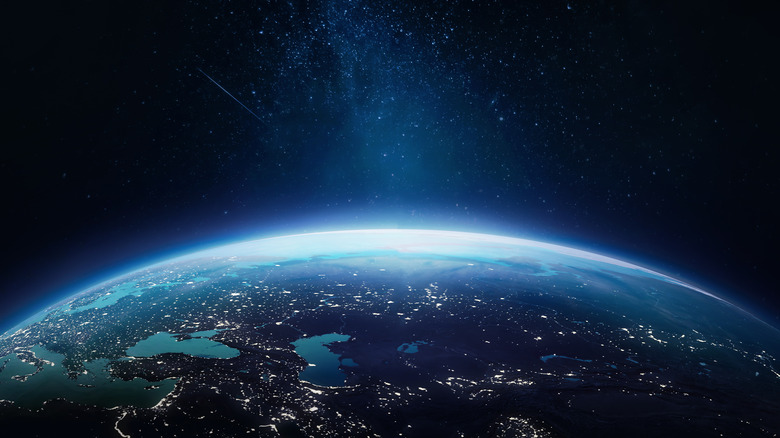The Truth About Dark Energy
A mere 20-30 years ago, astrophysicists had a very different opinion of how the universe might end. Of course, "end" is a tricky word when discussing cosmic-level events and the foundations of our material reality — physics — because "time" itself isn't even infinitely old. Time, and space, had a beginning: 13.8 billion years ago at the Big Bang. Within the first 10-44 seconds of our universe, called the Planck Epoch, a tempestuous soup of plasma and zipping fundamental particles expanded to 100 trillion-trillion times its original size, as Big Think explains. If space were to ever "end," time would end along with it, as they are, in fact, one "space-time" object.
And that's exactly what all manner of physicists believed would happen: the Big Crunch. Gravity would slow down the expansion of the universe, which continues to hurtle entire galaxies (like our Milky Way, which contains 100 – 400 billion stars, per NASA) and galaxy clusters (hundreds of such galaxies in a group) away from each other. Eventually, it was believed, the universe's gravitational forces — the same stuff that binds our feet to Earth's surface — would draw everything back in to an infinitesimally tiny spot, and then boom: another Big Bang. And so, Hinduism would be proven correct (but no one would be alive to notice): the universe itself exists in cycles and is reincarnated.
As it turns out, though, our universe has a much more terrifying, and absolutely frozen, fate. The culprit? Dark energy.
The unknown darkness fueling the expansion of the universe
The term "dark energy" might be a bit frightening, and dramatic, and conjure images of Tolkienesque magic users gone all necromantic. But it's called "dark" merely because no one yet knows what it is, nor do they have a way to directly see or measure it. Much like anything else that can't be seen with the naked eye (heat, wind, gravity), we know it by its effects, and those effects make its existence undeniable.
Basically, it's like this: The universe is expanding. And we don't mean that the stuff inside the universe — matter and energy — is zinging away from a single point like a thrown baseball. We mean that space itself is expanding, and the expansion is carrying along galaxies and galaxy clusters out of each other's reach, permanently. There are parts of the cosmos that we will never see from Earth, let alone travel to. Why? Because the universe is expanding faster than the speed of light. Meaning, farther objects' light will continue to travel toward us, perpetually, but never reach us. In fact, the 10 billion galaxies in the observable universe, and their 1 billion-trillion stars (per the University of California), only account for a mere 5% of the entire universe, as NASA states.
As the Hubble Space Telescope revealed in 1998, not only is gravity not slowing down the expansion of the universe, like folks once thought, the expansion is accelerating.
'Normal' matter might not be normal at all
So what in the world could possibly cause the universe to expand faster and faster? There's a few explanations, and they all fall under the umbrella term "dark energy" (i.e., "we don't know").
Remember that all of everything we've ever seen and known of space (the observable universe) comprises a paltry 5% of the entirety of the universe? Maybe what we consider to be normal matter — baryonic matter of protons, neutrons, electrons in shells — isn't "normal" at all. Perhaps the majority of the universe is subjected to conditions, or beholden to properties, that can account for its overall expansion. Einstein called this kind of property the "cosmological constant," and he pointed out that "empty space" isn't really "empty" in the way that an empty room doesn't have furniture — it's got particles, electromagnetic radiation, magnetic fields, neutrinos, cosmic rays, etc. And if space is expanding, and full of some expansion-generating property, then more space means more "energy-of-space," as NASA puts it, which means accelerated growth, and so on.
In its newest form, this kind of "dark energy" is described as a "dynamical energy fluid or field" that has been likened to what the ancient Greeks described as "quintessence," the fifth element after earth, wind, fire (not the musicians), and water. Alternatively, Einstein's theory of gravity — "gravity" is a mere property of the curvature of space-time — is just, well, wrong.
Our universe's ultimate, eternally empty, frozen fate
So the "Heat Death of the Universe" has a nice ring to it, no? Well, if the universe, by definition, is the, erm... space that comprises all of reality and its dimensions, and you happen to believe in an immortal, indivisible soul intent on occupying said space until the end of time...? Surprise!
Dark energy is not only the reason why we won't have a perpetual cycle of Big Bangs and Big Crunches, it's why we'll have a Big Freeze instead. All lights will go out in the universe, starting around cosmological decade 100 (the 100th tenfold increase in the size of the universe since the Big Bang), as the University of Michigan outlines. We live toward the end of the second of the universe's five eras, the Stelliferous Era (cosmological decades six – 14). This is the only era, barring outliers, where the creation of stars is possible. Dark energy will, eventually, propel all objects away from each other until nothing can collide, stars fade, all particles decay, even subatomic ones like quarks, and the entirety of reality will chill to a lightless, empty space of maximum, eternal entropy.
We hope that doesn't cause you insufferable existential terror. One day we might know what dark energy is, sure, for whatever good it will do. Until then, take the time to wonder and gaze up at stars that will one day be dragged out of our reach.



